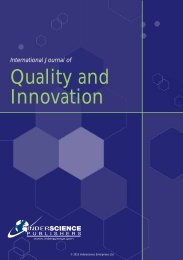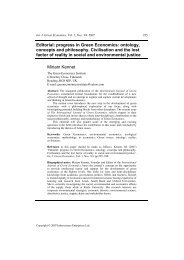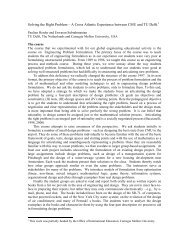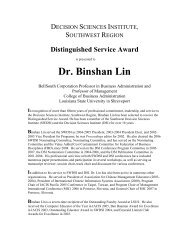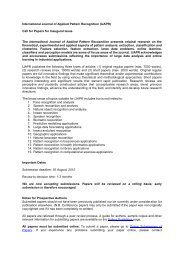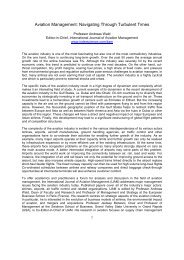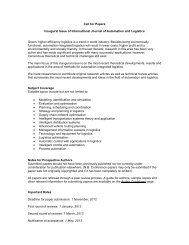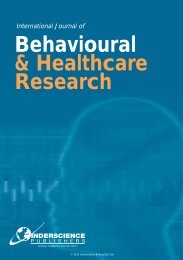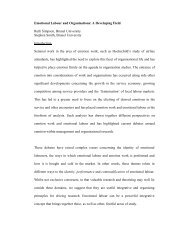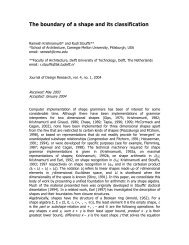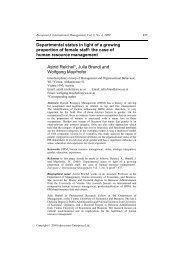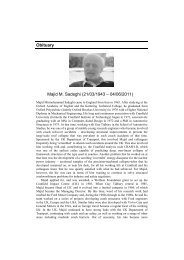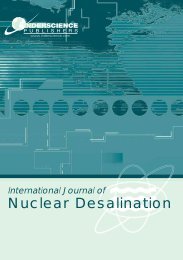A new Zeitgeist for international business activity and ... - InderScience
A new Zeitgeist for international business activity and ... - InderScience
A new Zeitgeist for international business activity and ... - InderScience
You also want an ePaper? Increase the reach of your titles
YUMPU automatically turns print PDFs into web optimized ePapers that Google loves.
A <strong>new</strong> <strong>Zeitgeist</strong> <strong>for</strong> <strong>international</strong> <strong>business</strong> <strong>activity</strong> <strong>and</strong> scholarship 283<br />
of wealth creation, <strong>and</strong> the role of extra-market entities viz. national governments, NGOs<br />
<strong>and</strong> supranational entities have softened over the past two decades.<br />
At the same time, the objectives <strong>and</strong> values of individuals <strong>and</strong> organisations have<br />
changed or have been reprioritised. Improvements in living st<strong>and</strong>ards have led to more<br />
choice. Personal intentions <strong>and</strong> aspirations have become multi-dimensional, <strong>and</strong><br />
frequently include the provision of goods <strong>and</strong> service which the market (by itself) cannot<br />
or will not provide. In a recently published monograph, Benjamin Friedman has argued<br />
that the wellbeing of communities should best be measured by the extent to which<br />
the majority of their population benefits from a rise in GDP (Friedman, 2006).<br />
Belief systems, as they affect risk taking, the work ethic, corporate social responsibility<br />
<strong>and</strong> the role of civil society are also under scrutiny.<br />
The demise of communism, the marketisation of the Chinese economy, a better<br />
appreciation of differences in the different behavioural patterns of ethnic <strong>and</strong> religious<br />
groups, <strong>and</strong> the rise of libertarianism in the West, are leading to a clearer distinction<br />
between institutions favouring an individualistic <strong>and</strong> those preferring a collectivist<br />
(or communitarian) approach to the wealth creating process. Again the choice between<br />
the two options is often a false one. Each has a role to play, but exactly what this role<br />
is – is not easy to identify – particularly, as it is continuously changing!<br />
Lastly the motives, cognition <strong>and</strong> behaviour of managers of global corporations,<br />
together with the role of social <strong>and</strong> ethical capital as a competitive advantage of<br />
countries, are inducing a <strong>new</strong> spirit towards the ingredients of wealth creation<br />
<strong>and</strong> the manner of its achievement (Donaldson, 2001). Each of these triggers a mindset<br />
change that is being continually refashioned by world economic <strong>and</strong> social events<br />
(Levy et al., 2007). Why is this, <strong>and</strong> how?<br />
First there is the ‘awareness’ or ‘consciousness’ factor, made possible by travel,<br />
the media, <strong>and</strong> the internet, which has provided in<strong>for</strong>mation about different intentions,<br />
attitudes <strong>and</strong> ethical perspectives towards the means <strong>and</strong> ends of wealth creation <strong>and</strong><br />
usage. Second, the mingling of different mindsets <strong>and</strong> belief systems can lead, <strong>and</strong> is<br />
leading, to a reappraisal of some traditional social mores <strong>and</strong> institutions. And third,<br />
while some long cherished cultural or religious ideologies are hardening <strong>and</strong> becoming<br />
more distinctive, in others, there is an appreciation of the need <strong>for</strong> a global mindset<br />
e.g., with respect to human rights <strong>and</strong> working conditions (the so called hypernorms<br />
identified by Donaldson <strong>and</strong> Dufee, 1999).<br />
In short, our contemporary l<strong>and</strong>scape, <strong>and</strong> particularly the interconnectivity <strong>for</strong>ged by<br />
globalisation <strong>and</strong> the uncertainties <strong>and</strong> complexities of technological change, is bringing<br />
about a reconfiguration of the composition of <strong>Zeitgeist</strong>. Most particularly this<br />
reconfiguration is shown in the paradox between the kind of mindsets <strong>and</strong> incentive<br />
structures which globalisation dem<strong>and</strong>s, <strong>and</strong> those which protect the distinctive cultures<br />
<strong>and</strong> belief systems of people <strong>and</strong> organisations in particular locations. This paradox<br />
produces a conflict of intentions <strong>and</strong> values (rather similar to Isaiah Berlin’s conflict of<br />
virtues: Berlin, 1991) which is yet another aspect of our contemporary <strong>Zeitgeist</strong>.<br />
3.3 New actors on the world stage<br />
Yet there is one other component of the spirit of the age which is worth identifying.<br />
Again it both influences <strong>and</strong> is influenced by the other two. We refer to this as<br />
New Actors on the World Stage. Up to the early 1990s, there were three dominant wealth<br />
creating entities viz. firms, national governments <strong>and</strong> supranational agencies. Since then,



